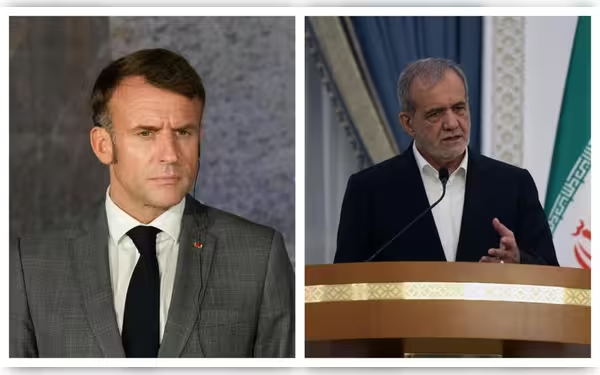Saturday, November 16, 2024 07:44 PM
Macron Urges Iran to Support Mideast De-Escalation Amid Gaza Crisis
- Gaza conflict escalates with rising civilian casualties.
- Israel intensifies military operations in northern Gaza.
- Humanitarian crisis worsens as food and medical aid are blocked.
 Image Credits: arabnewspk
Image Credits: arabnewspkMacron calls on Iran's president to support de-escalation efforts amid the escalating humanitarian crisis in Gaza.
In a world where conflicts often seem unending, the situation in Gaza has reached a critical juncture. A year has passed since the war with Hamas erupted, and the toll on human life continues to rise. Israel has been conducting almost daily strikes on what it claims are militant targets in Gaza. Tragically, these strikes have resulted in the loss of innocent lives, including a recent incident in the Nuseirat refugee camp where a family of eight, including six children aged between 8 and 23, was killed. This heartbreaking event has left many in the community in mourning, as families grapple with the devastating impact of the ongoing violence.
According to reports from Al-Aqsa Martyrs Hospital, the situation in Gaza is dire. The Israeli military asserts that it aims to minimize civilian casualties, attributing the deaths of innocents to Hamas and other armed groups that operate in densely populated areas. However, the reality on the ground tells a different story, as families continue to suffer the consequences of this conflict.
In northern Gaza, Israeli forces have intensified their operations, particularly in Jabaliya, where they claim militants have regrouped. The military has ordered a full evacuation of northern Gaza, including Gaza City, leaving an estimated 400,000 people still in the area. This mass evacuation has raised fears among Palestinians that Israel may be attempting to permanently depopulate the north to establish military bases or Jewish settlements.
The humanitarian situation is further exacerbated by the United Nations' reports indicating that no food has entered northern Gaza since October 1. Hospitals have also been included in evacuation orders, but the military has not provided a clear timetable for these actions, complicating the transfer of patients and medical care.
Fares Abu Hamza, an official with the Gaza Health Ministry’s emergency service, highlighted the grim reality on the ground, stating that many bodies remain uncollected from the streets and rubble. He expressed the urgency of the situation, noting that some remains are being consumed by dogs, a stark reminder of the chaos and despair that has engulfed the region.
The conflict began a year ago when Hamas-led militants launched an attack that resulted in the deaths of approximately 1,200 people, primarily civilians, and the abduction of around 250 individuals. Currently, around 100 hostages are believed to be held in Gaza, with a third thought to be deceased. The ongoing bombardment and ground invasion by Israel have reportedly resulted in the deaths of over 42,000 Palestinians, according to the Gaza Health Ministry. This figure includes a significant number of women and children, who make up more than half of the casualties.
As the situation continues to unfold, it is essential to recognize the human cost of this conflict. The loss of life, the destruction of homes, and the displacement of families paint a grim picture of the realities faced by those living in Gaza. While political leaders may call for de-escalation and peace, the path to resolution remains fraught with challenges. It is crucial for the international community to engage in meaningful dialogue and seek solutions that prioritize the safety and well-being of all individuals affected by this ongoing crisis.













